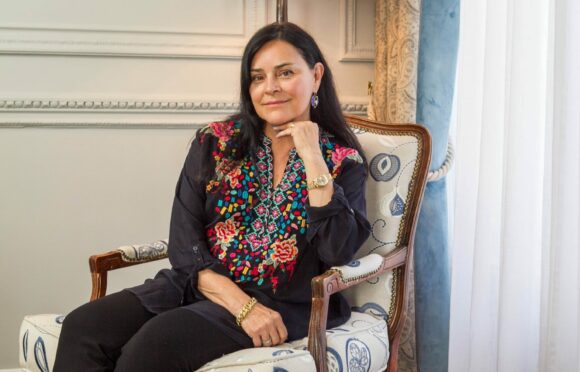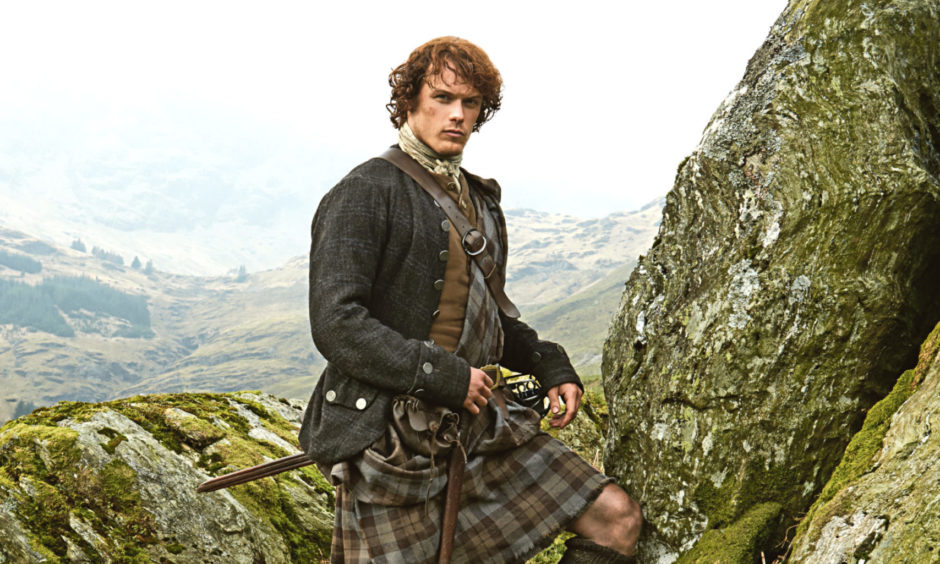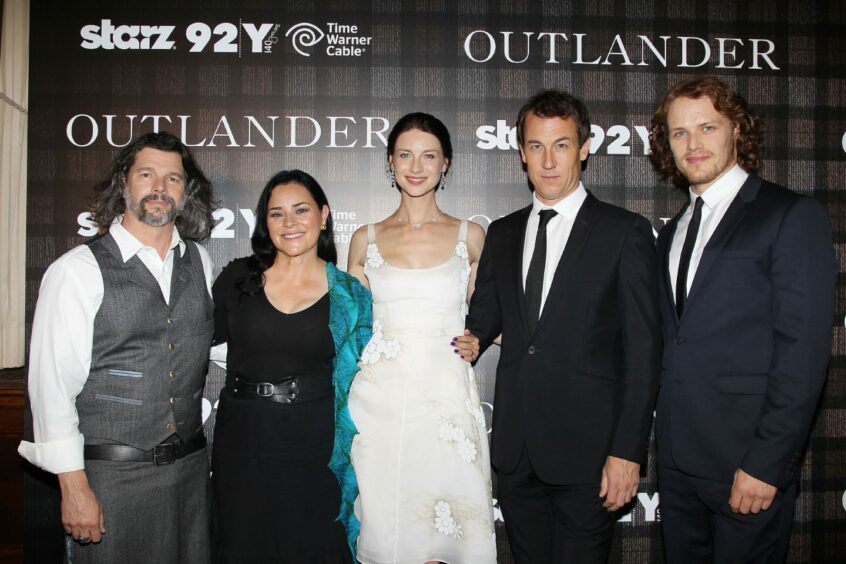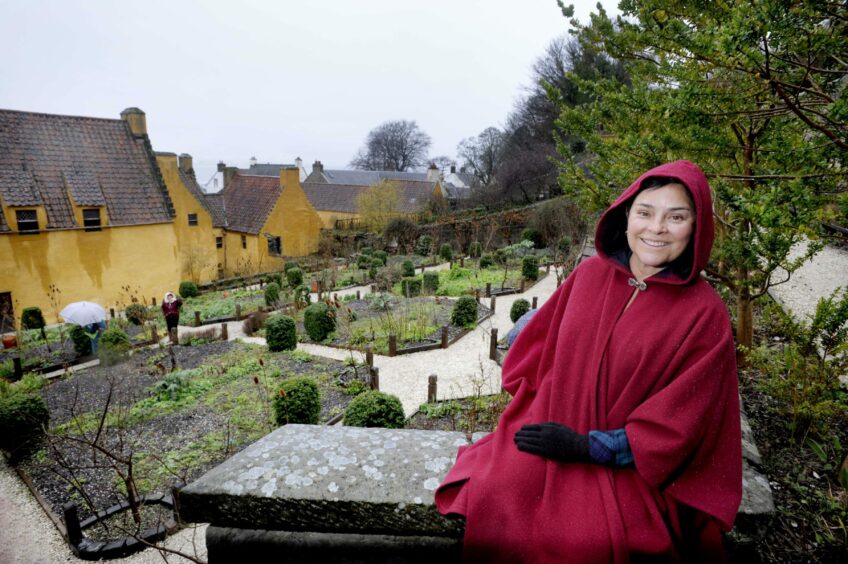
Outlander creator Diana Gabaldon knows good chemistry. And it has nothing to do with the three science degrees she holds.
The US based writer created the best-selling books on which the sizzling, time-travelling TV drama was based. The novels feature an 18th-Century Scottish warrior, ginger hunk Jamie Fraser, and Claire Randall, the married English Second World War nurse who falls hopelessly in love with him. And like her characters, Gabaldon admits she has herself succumbed to similar temptation.
It’s two in the morning Arizona-time when P.S. Zooms in for a chat with the multi-award-winning author. Gabaldon, whose novels (which are partly set in Highland Scotland) have sold more than 50 million copies worldwide, is at work when we call. It’s timely, the long-awaited season seven of the TV series based on the novels launched in the US on Friday, hotly followed by the UK.
In soft lamplight beside bookshelves groaning under the weight of 2,000 Scottish research tomes, and with the family dogs Lucy and Roast Beef asleep at her feet, she explains: “My husband likes to go to bed around 9pm so I tuck him in and then fall asleep on the couch with the dogs. But I wake up again about 12.30am. I get a diet coke and the dogs get a bone, then I come upstairs to write until about 4.30am, when I go and slip back into bed.”
And she reveals it is the man in her bed who was her greatest temptation, colouring the Outlander debut that published in 1991. Gabaldon, now 71, smiles: “Part of it has to be experience. I was engaged to a nice young man when I was in college. About six months after we became engaged, I walked into the first day of Marching Band practice and sat down next to this tall, red-headed French Horn player. At the end of that practice, I gave my fiancé back his ring. I have been married to that French Horn player for the last 51 years.”
The life-changing moment took only 90 minutes. “I thought that if I can feel so strongly for someone who I have known for about an hour-and-a-half, I should not be marrying this other fellow,” she says. “It’s about finding the right person.”
Her Mr Right – Doug Watkins with whom has three grown-up children and two grandchildren – now finds his words dropping into the novels and scripts she writes for the TV series starring New Galloway’s Sam Heughan as Jamie Fraser and Dublin’s Caitriona Balfe as Claire aka Mrs Fraser. She smiles: “At the end of the fifth book, The Fiery Cross, Jamie says, ‘When I die, if my last words aren’t I love you, it’s because I didn’t have time.’ This is something my husband said to me one morning.”
Outlander origins
The writer – who has a PhD in quantitative behavioural ecology and degrees in marine biology and zoology – was 36 when she began writing Outlander. Her children Laura, Samuel (also a writer) and Jennifer, were six, four, and two at the time.
“I love science and I am good at it,” says the former university professor. “But I knew from the age of eight I was meant to be a novelist. I also realised that it was an uncertain way to make a living. Both my parents grew up in the Depression and were very frugal, and so I didn’t tell them or my husband. I had two full-time jobs and three small children.
“He would have tried to stop me because he would have feared I’d drop dead from exhaustion. But I was 35 and I knew if I didn’t write it then, I might never do it. It was to be a practice book, not for publication.”
It was the early days of personal computers, and her husband ran a software enterprise serving businesses. She was a trainer for the company and quickly realised the PC – as limited as it was then – was just what she needed to organise her “practice” novel, excerpts of which she shared with a fledgling online literary forum. The feedback she received was so positive, it propelled her.
But the book files she stored, titled Jamie, were discovered by her husband. “He looked at me and said, ‘Who’s Jamie?’” When she told him she says, laughing, “he cautiously began asking questions and reading off the screen in what he imagined to be a Scottish accent.”
The inspiration for Jamie came from a rerun of a 1960s Dr Who played by Patrick Troughton, with Frazer Hines, appearing as kilted Highlander James Robert McCrimmon. She says: “I was still thinking about that young man in a kilt the next day. I decided on 18th-Century Scotland as a starting point for the book. But I needed at least one woman for the sexual tension. I sent this woman into a cottage where there were a lot of Scotsmen in kilts sitting around a fire.”
She explains that as one of the men, Dougal MacKenzie (played by Graham McTavish) stands to speak, the woman – Claire – demands, ‘who the hell are you?’ Gabaldon grins: “She didn’t sound at all like an 18th-Century woman. I fought with her for several pages trying to beat her into shape, but she wasn’t having it. She just kept making smart-ass modern remarks and started telling the story herself. So, I said, ‘alright, I’m not going to fight with you all the way through this book, go ahead and be modern, I’ll figure it out later.’ And that is how she time travels.”
Gabaldon completed the debut, and, encouraged by the literary group, landed an agent, selling the book to a publisher in a three-way auction that led to a three-book deal. Almost seven books on, and now into the seventh TV series, she hasn’t looked back – except to consider her creative origins, and the British forebears she can trace back to 1327.
“My father Antonio Gabaldon’s family are Hispanic but on my mother’s side they were British. My great-great-grandfather Godfrey Sykes designed the façade of London’s South Kensington Museum that became the Victoria and Albert, he was one of Queen Victoria’s royal artists,” she reveals. “His son, my great-grandfather Stanley Sykes was a founding father of Flagstaff, Arizona, and his son, my grandfather Harold became its mayor. That side of the family were very literate. But my father, the youngest of 13 children, was the only one to graduate from college. He went on to become a state senator. My mother, Jacqueline Sykes, was a teacher and taught me to read at three. We lived next door to my great-grandparents who had bookshelf after bookshelf. Our own house was just the same.”
The past and the future
Some of the Outlander cast share her passion. She says: “The show films in Cumbernauld and I write one script per season for them. If I am working, I am on set with the cast or if I am not working but am in Scotland, I drop in to see them. We go out to eat, drink whisky and sit around and talk. I realised most actors are frustrated writers at heart. A good many of them from the show want to write. Often at lunch one of them would sidle up and ask if I have any suggestions.” She smiles as she recalls how Heughan and McTavish published Clanlands.
She says: “The moment I saw Scotland I felt that it was home. Having visited for 35 years I have a special feeling in my heart for the country and the Highlands. The history is amazing. Scotland is multi-faceted, it is like looking into a diamond.”
And while the country will always remain with her – her youngest daughter and grandsons live in Edinburgh, and she will be back for the launch of the Outlander conference at Glasgow University in July – the lovers who made her famous may not.
The eighth season in the TV series will likely be the last she says, as may the 10th book featuring Jamie and Claire. “I am intending it to be the final one so that I can bring the series to a satisfying conclusion. I am 71 and don’t know how long I am going to last, but women in my family tend to go on into their 90s and I have every hope of doing so myself. It’s the Hispanic genes.”
And then, with a tantalising grin, she adds: “I wrote Outlander for practice. As I got to the third book in the three-book contract, I surprised the agent when I called to say, ‘I am afraid there is a fourth book’. So, perhaps the 10th may not be the last…”
Series led to Scots travel lift
Since the Outlander novels made TV screens in 2014, tourism in Scotland has boomed.
The Outlander Effect and Tourism paper, published in 2019 indicated that attractions that appear in the series saw visitor numbers soar by 67% from 887,000 to 1.5 million, earning creator Diana Gabaldon an International Contribution to Scottish Tourism award at the Scottish Thistle awards.
Latest research by the Association of Leading Visitor Attractions shows that post-pandemic, international visitors flooded back to Scotland in 2022 with an average 128% increase in visits.
And sites associated with Outlander saw some of the biggest spikes, thanks to “set-jetters” wanting to visit the locations after bingeing on the show in lockdown. Doune Castle near Stirling, famed for its role as the fictional Castle Leoch in the series, saw a 1,650% increase in visits from just 3171 in 2021 to 55,484 last year.
Glencoe Visitor Centre in Highland, whose surrounding landscape featured in Outlander’s opening credits, also saw an increase with 344,896 visitors, up 166% from the previous year.
Other popular locations include Culloden Moor battle ground near, Loch Ness and Urquhart Castle, and The Highland Folk Museum at Newtonmore, whose turf-roofed crofts were used as the location for the 18th-Century MacKenzie village.

Enjoy the convenience of having The Sunday Post delivered as a digital ePaper straight to your smartphone, tablet or computer.
Subscribe for only £5.49 a month and enjoy all the benefits of the printed paper as a digital replica.
Subscribe
 © Amanda Schwab/Starpix/Shuttersto
© Amanda Schwab/Starpix/Shuttersto © Colin Hattersley / Visit Scotlan
© Colin Hattersley / Visit Scotlan